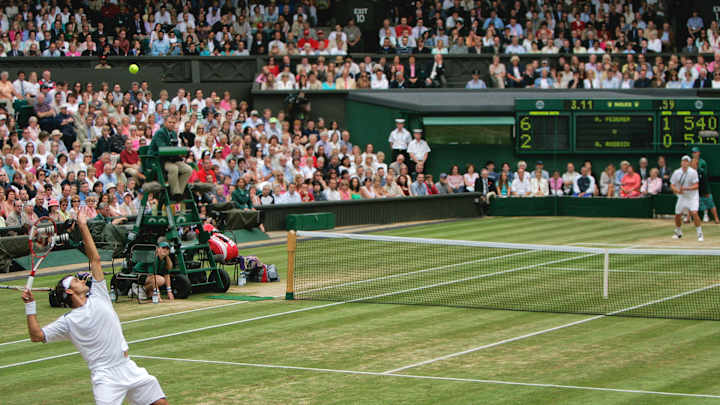Wimbledon Lifts Ban on Russian Players

LONDON (AP) — Russian and Belarusian players will be able to compete at Wimbledon as neutral athletes after the All England Club on Friday reversed its ban from last year.
The players must sign declarations of neutrality and comply with “appropriate conditions,” including not expressing support for Russia’s invasion of Ukraine.
“This was an incredibly difficult decision, not taken lightly or without a great deal of consideration for those who will be impacted,” All England Club chairman Ian Hewitt said in a statement.
The players cannot receive funding from the Russian or Belarusian states, including sponsorship from companies operated or controlled by the states.
Australian Open champion Aryna Sabalenka of Belarus and Russian players Daniil Medvedev and Andrey Rublev are among the players who can return.
Ukrainian Foreign Minister Dmytro Kuleba condemned the reversal as “immoral.”
“Has Russia ceased its aggression or atrocities? No, it’s just that Wimbledon decided to accommodate two accomplices in crime. I call on the UK government to deny visas to their players,” Kuleba wrote on Twitter.
Other tennis tournaments have allowed Russian and Belarusian players to compete as neutral athletes—their nationalities are not listed in the brackets, official results or graphics on TV broadcasts of matches. But, as in some other team sports, Russia and Belarus were not permitted to participate in the Billie Jean King Cup or Davis Cup by the International Tennis Federation.
“We also consider alignment between the Grand Slams to be increasingly important in the current tennis environment,” the All England Club said.
The same conditions will apply for Lawn Tennis Association tournaments used by players as grass-court warmups for the sport’s oldest Grand Slam tournament.
The women’s and men’s professional tennis tours last year imposed heavy fines on the LTA and threatened to pull its tournaments. The effect of being expelled from the tours, the LTA said, “would be very damaging and far reaching for the game in our country.”
The ATP and WTA had also responded to last year’s ban by not awarding ranking points for Wimbledon—an unprecedented move against the prestigious event.
“There was a strong and very disappointing reaction from some governing bodies in tennis to the position taken by the All England Club and the LTA last year with consequences which, if continued, would be damaging to the interests of players, fans, The Championships and British tennis,” the club said.
This year’s Wimbledon tournament will start on July 3. The women’s final is scheduled for July 15 and the men’s final on July 16.
The All England Club said the conditions were developed through talks with the British government, the LTA and “international stakeholder bodies in tennis.”
The club’s statement described “personal player declarations” but didn’t provide details. The LTA said the players and support staff “will be required to sign neutrality declarations” similar to those used in other sports.
In a joint statement, the ATP and WTA said they were satisfied with the outcome.
“It has taken a collaborative effort across the sport to arrive at a workable solution, which protects the fairness of the game,” the tours said. “This remains an extremely difficult situation, and we would like to thank Wimbledon and the LTA for their efforts in reaching this outcome, while reiterating our unequivocal condemnation of Russia’s war on Ukraine.”
